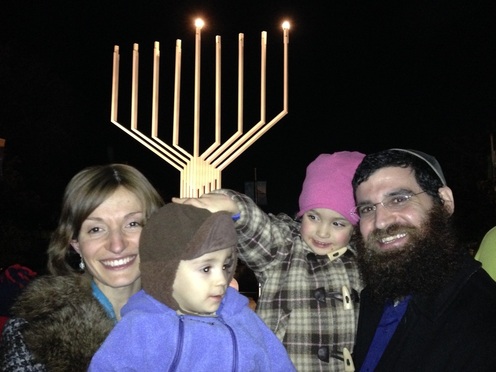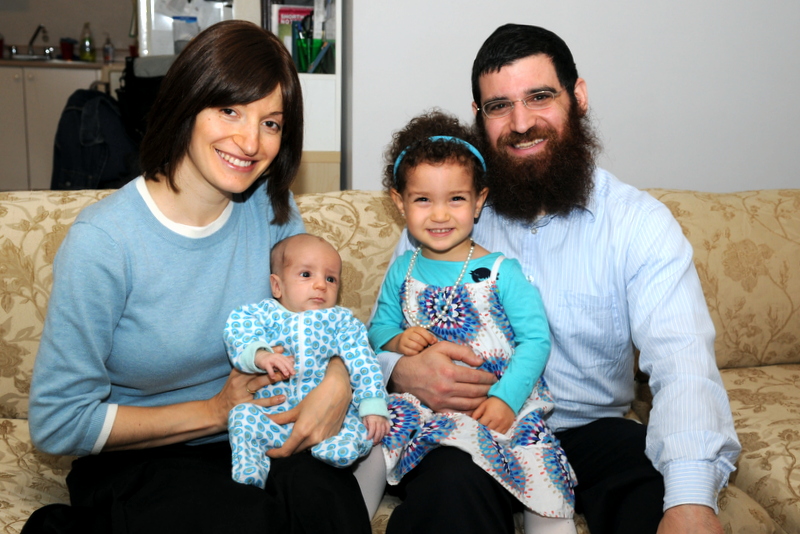Therefore, our first encounter would have to be via telephone. I was okay with that and I casually asked the Rebbetzen to email me a picture so I could see it before the phone call the next day. It goes without saying that without seeing a picture there was no point in talking, right? After all, I wasn’t going to buy an international airplane ticket and fly to Israel to meet a girl that I had never seen. That would be crazy! Well, I was about to learn a very important lesson from a very important (and wise) 20 year old.
The Rebbetzin assured me that there was time to decide about flying to Israel and that before getting ahead of myself, I should give Ettie a call and talk, seeing if we clicked and if I would even be interested in meeting her. That made sense to me and so the following evening I called Ettie (who actually unbeknownst to me was reluctant to speak with me to begin with). We talked for several hours (our most expensive ‘date’ ever) and towards the middle of the conversation, I carefully alluded to the idea of exchanging pictures.
In her characteristic manner, Ettie was straightforward and to the point. She said that she saw absolutely no reason for us to see pictures of one another. Marriage is not about physicality, it is about spirituality, she explained. Our looks change; it is about what is on the inside that matters, and how you use it. You do not marry someone because you think she is beautiful or he is handsome, she stressed. You marry them because they make you want to become beautiful, for them and for yourself, she emphasized.
I wasn’t really sure I understood what she meant, but I knew that I was speaking with my soul mate, and that was enough for me. By the end of the conversation, I knew that I no longer needed to see a picture and based on her sweet singsong tone alone (and her calm reassuring voice), I was convinced that she was beautiful. So when I spoke to the Rebbetzin the next day, I let her know that I wouldn’t need to see a picture after all. In fact, I was ready to buy an airplane ticket.
When I flew to Israel the following week and we met for the first time, I was happy to find out that my hypothesis was correct: Ettie was indeed very very pretty, a mix of regal royalty and spontaneous casualness. After a brief engagement, we were married on the 12th of Menachem Av and thank G-d this past summer we celebrated our eighth anniversary.
Over the years, I have learned what love, trust, passion, forgiveness, and commitment mean. However, it wasn’t until this past week that I really understood what it means to put someone else first; not just some of the time, but all of the time. Ettie is an incredibly talented person. She is a savvy financial planner, compassionate counselor and confidant, fantastic baker, wonderful photographer, eloquent writer, detail-oriented editor, blooming artist, athlete par excellence, do-it-yourself craft and project maven, exceptional educator, and a devoted mother with endless patience and creativity. She could be pursuing and excelling in a variety of career options and engaging in many different hobbies in her spare time. Yet, she chooses to be a fulltime homemaker, with her primary role as wife, mother, and teacher to our children.
In the evenings, when Ettie manages to find some free time for herself, she uses those precious undisturbed moments to work on my website, edit my articles, motivate me to write, listen to my divarei Torah and make them more articulate, and push me to exercise. She always insists that I take some time to relax, read, and learn Torah, not to mention many other selfless acts. When Ettie could rightfully take some well deserved “me time,” instead she gives of herself, transforming it into “you time.”
The greatest bracha or l'chaim a person can give is to bless someone to live up to his or her potential; to really become who Hashem truly meant them to be. To give such a bracha is thoughtful to say the least. But, when a person puts him or herself aside and dedicates their whole being with passion and enthusiasm to actively ensure that her husband becomes the person she knows that he can be; that is true beauty.
We know that our forefather Yaakov had two wives: Rachel and Leah. Rachel was known for her outer beauty, her graceful appearance, and her sweet disposition. Leah, on the other hand, was strong, intellectual, and determined. Following a pivotal journey, Hashem changed Yaakov's name to Yisrael because he wrestled with an angel and overcame; that is, Yaakov wasn't afraid of a challenge. Thus, it was the transformed Yisrael who married Leah. It is no coincidence that Ettie's full name is Ettel Leah Zissel, and my name of course is Nuta Yisrael. In our case, Yisrael married Leah on purpose; and found that in essence he got the best of both worlds.
We are now celebrating the holiday of Chanukah, a special time dedicated to lighting up the world. We are instructed to light the menorah either by a window or by a door in order that the light from the menorah should shine out and light up not only our own home but also the lives and hearts of others. It is no coincidence that Ettie's birthday is on the first night of Chanukah. On the first night we light only one candle; and yet this one candle is enough to dispel darkness and illuminate our minds and hearts.
Every single person can be compared to a candle. Each and every one of us has the power to light up someone else's world. Like a candle, we are able to bring light and joy to someone else without diminishing our own flame. Relationships of all sorts require the investment of light. Whether it is the bond between spouses, parents and children, colleagues, or friends, the solid foundation for any relationship is when more time is spent focusing on the other person, rather than on oneself. In a marriage especially, this is how a true partnership is formed. This is true love.
Ettie has decided to devote her potential into making sure I and our children maximize our G-d given talents, capabilities, and skills. Ettie was correct; it is what’s on the inside that counts. It has taken more than a picture and eight years of marriage, but I finally understand what my wife meant about beauty; and I finally now know how gorgeous she really is.
Wishing you and yours a truly beautiful and joyous Chanukah,
Rabbi Nuta Yisrael Shurack






 RSS Feed
RSS Feed
